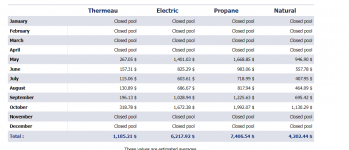Are you saying that you have both a heat pump and gas heater connected to your pool?
Yes. I have a heat pump and gas heater, and I have a pool and spa. Most of the time the gas heater is spa only, but when it's Christmas and the extended family is around, it's fun to swim sometimes.

. However, I primarily have the heat pump for extending the usage of the pool. Now is a good example, on days when it's sunny and 70's it would be fun to swim; except the water temp is still in the 60s. So the overanalytical side of me wanted to know, when heating a pool from 64 to 84 with average air temperature of 60 degrees (highs in 70s, lows in 50s), at which point does the cost of the heat pump intersect with the cost of the gas heater. e.g. is 12 hrs of the heater the same as 12 days of the heat pump? At which point I've "lost" 12 days of swim time.
I know that maintaining the temperature is most cost effective with the heat pump - so I'm not worried or questioning that. I know the gas heater will heat the water quicker. I'm trying to determine when the cost/times curves converge.
it is also important to look at the spec sheets closely as the COP (just like the heating capacity) is strongly dependent on the temperature difference between the water and the air that you are trying to pull the heat from.
Yes, and this is a little maddening as the primarily advertised COPs seem to be based on 80/80/80 (air, water, humidity). For my own heat pump (UltraTemp 140) the ratings are quite different.
On this site, they show at 80/80/80 it's 140,000/5.6 but at 50/63/80 it's 85,000/4.0, so of course that will impact the calculations.
"How long will it take to warm up my pool" you have to consider the amount of heat being lost to the environment if the pool is warmer than the surrounding air and earth.
Yes. I see a lot of heat pump calculators have an option for "pool cover", which I have. It does make a difference, which is good. I'm less concerned with exactly how long it will take vs. being able to model the overall time and cost to heat to a given temp.



